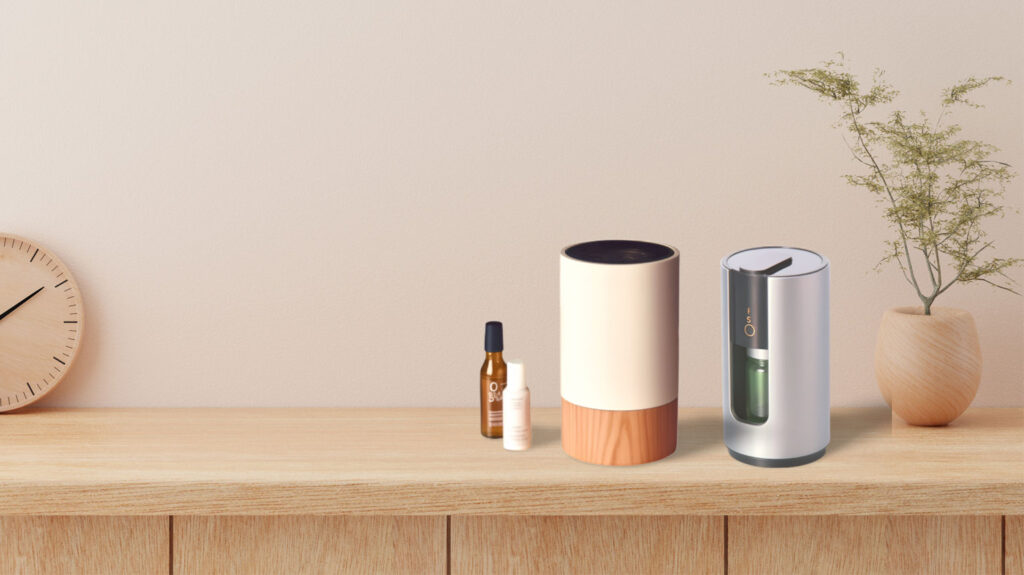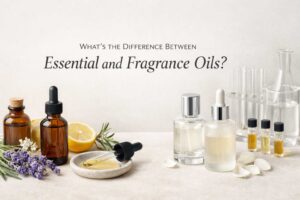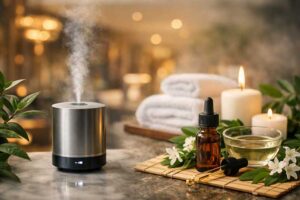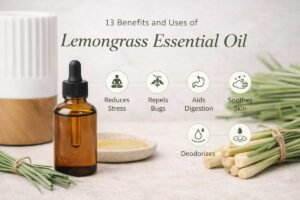
Diffuser vs Humidifier: What’s The Difference of the Two?
- September 24, 2023
Are you caught in the debate of diffusers vs humidifiers? Here’s a quick guide to help you make the perfect decision for your household air quality needs.
Table of Contents
Different rooms in your house have other purposes, and to optimize each room, you must incorporate a suitable air quality device. For example, the use of diffusers and humidifiers has increased, with more people recognizing their benefits for health and comfort.
You can opt for ultrasonic diffusers, evaporative humidifiers, and more. But make sure you pay close attention to each device’s specific features and functions.
For most people, there’s a huge debate over diffusers vs. humidifiers. However, we have compared both of these devices to solve the dilemma.
About Diffusers and Humidifiers
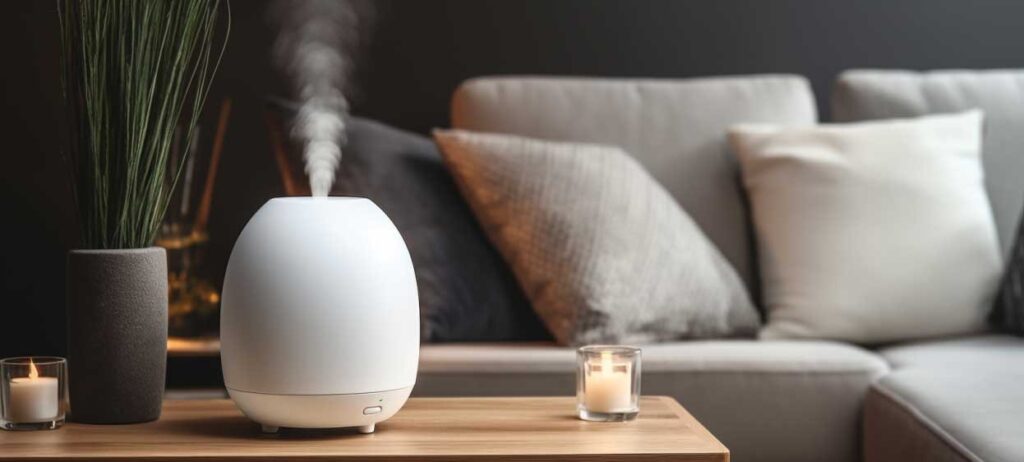
Before we delve into the debate of diffusers versus humidifiers, let’s first understand what these devices are and how they function. Both diffusers and humidifiers play a crucial role in enhancing the air quality in your home, but they do so in different ways.
A diffuser, for instance, is a device that sprays essential oils into the air, creating a pleasant aroma. It breaks down the oil into micro-particles and then sprays them into the air. This process fills the room with a soothing fragrance and allows you to inhale the therapeutic benefits of the essential oils.
On the other hand, a humidifier is a device that increases the humidity level in a room or an entire building. It releases water vapour or steam to increase moisture levels in the air. This can be particularly beneficial in dry climates or during winter when indoor air becomes dry due to heating systems.
Different types of diffusers and humidifiers are available on the market, each type with unique features and benefits. Here’s a list to help you understand the range of options out there:
Diffusers:
1. Ultrasonic Diffusers: Use water and ultrasonic waves to create a mist of water and essential oils dispersed into the air.
2. Nebulizing Diffusers: Atomize essential oils without water, dispersing them directly into the air as a fine mist.
3. Evaporative Diffusers: Evaporate the essential oils and use a fan to disperse the scent into the room.
4. Heat Diffusers: Use heat from a candle or electricity to evaporate and disperse the essential oils.
Humidifiers:
1. Central Humidifiers: These humidifiers are Built into your home’s HVAC system and provide moisture throughout the house.
2. Evaporative Humidifiers: These humidifiers use a wicking filter to draw water from the tank and emit a fine mist using fans.
3. Ultrasonic Humidifiers: These humidifiers use high-frequency vibrations to create a mist, which can be either cool or warm.
Cool mist: ultrasonic vibrations break the water into tiny droplets, releasing it into the air as a cool mist.
Warm mist: A heating element warms the water before it’s turned into a mist.
4. Steam Vaporizers: Steam vaporizers heat water and cool it before expelling it into the air.
5. Impeller Humidifiers: Impeller humidifiers use rotating disks to create a cool mist.
Choosing between a diffuser and a humidifier often sparks a debate among homeowners due to their distinct functions and benefits.
Diffusers: An Overview

Diffusers spray the essential oils into the air, creating a pleasant and therapeutic aroma. They break down the oil into micro-particles and then disperse them into the air. This process fills the room with a soothing fragrance and allows you to inhale the therapeutic benefits of the essential oils.
Diffusers are best used for aromatherapy, which uses natural plant extracts to promote well-being and health. They can be used in various settings, including homes, yoga studios, spas, and offices. They are particularly beneficial in creating a relaxing environment, promoting better sleep, and enhancing mood.
The benefits of using diffusers are numerous. Firstly, they help create a calming, soothing atmosphere that promotes relaxation and stress relief. Secondly, they can be used with various essential oils, each offering unique health benefits. For instance, lavender oil is known for its calming properties, while eucalyptus oil can help with respiratory issues.
Moreover, diffusers can also help improve air quality by reducing dust and allergens. They also offer a natural and safe alternative to synthetic air fresheners. It’s important to note that the effectiveness of diffusers can vary depending on the type of diffuser and the quality of the essential oils used.
Humidifiers: An Overview
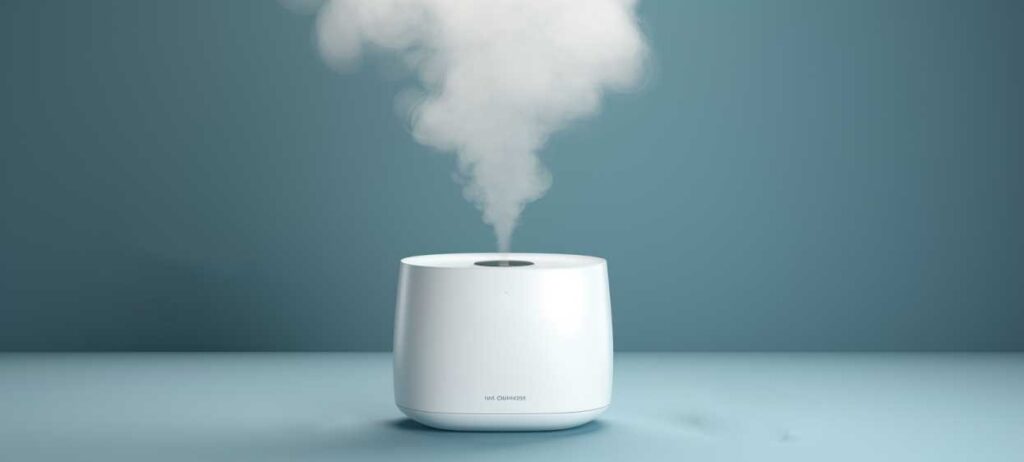
In the discussion of diffusers versus humidifiers, humidifiers represent a device that increases the humidity or moisture level in a single room or an entire building. They work by emitting water vapour or steam into the air, thus increasing the overall moisture content.
Humidifiers are best used in environments where the air is dry, such as in cold winter or air-conditioned rooms. They are particularly beneficial in preventing and relieving skin, throat, lips, and nose dryness. They can also help with symptoms caused by the flu or common cold.
The benefits of using humidifiers are manifold. Firstly, they help maintain a healthy humidity level in the room, which is crucial for comfort, health, and the preservation of wooden furniture. Secondly, they can help alleviate common cold, flu, and allergy symptoms by keeping the nasal passages and throat moist.
Moreover, humidifiers can help reduce snoring, keep the skin and hair moist, and even help houseplants by providing the necessary humidity. However, it’s important to note that overuse of humidifiers can lead to excessive humidity in the room, promoting mould growth and dust mites. Therefore, it’s crucial to maintain an optimal humidity level, usually between 30% and 50%.
Despite their benefits, using humidifiers may not be suitable for everyone, especially those with asthma or allergies, as they can sometimes worsen the symptoms. Therefore, it’s always advisable to consult a healthcare provider before using a humidifier.
Diffusers vs. Humidifiers: General Overview

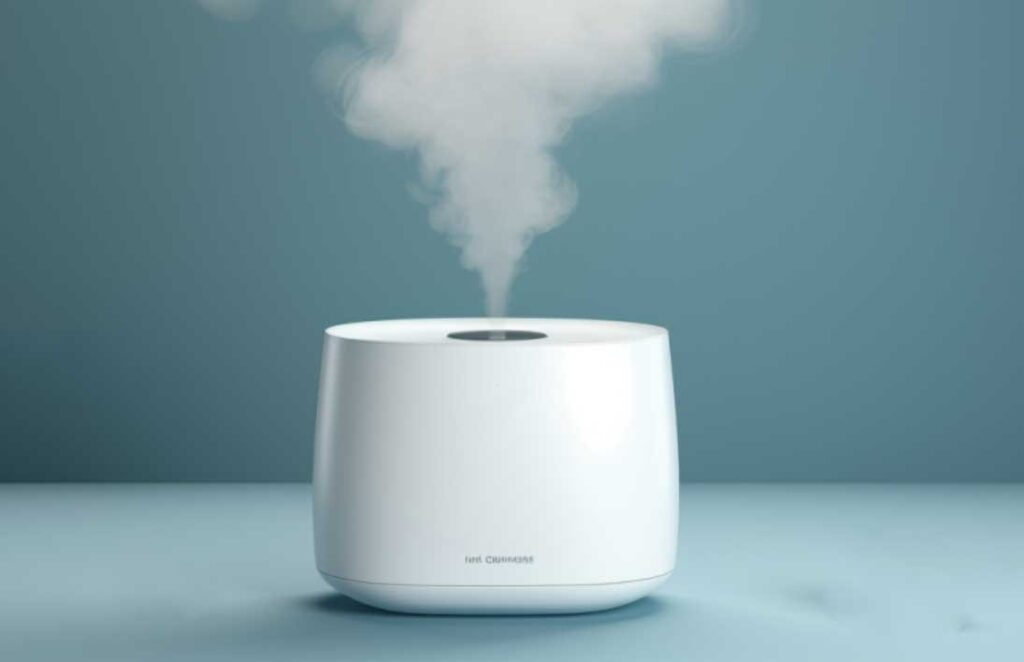
When you examine the transition from diffusers to humidifiers, it’s quite an interesting shift from a device that sprays essential oils into the air to one that increases the moisture level in the room. However, since diffusers are best for creating a soothing and therapeutic environment, humidifiers have several applications in maintaining a healthy humidity level in the room.
Also, remember that diffusers are primarily used for aromatherapy and creating a pleasant atmosphere, while humidifiers combat dryness in the air. At the same time, some devices combine the functions of both a diffuser and a humidifier, providing both moisture and a pleasant aroma to the room.
Meanwhile, the choice between a diffuser and a humidifier often depends on the specific needs and preferences of the user. Here’s a more understandable way to learn about diffusers and humidifiers:
Diffusers: Yoga studios, Spas, Bedrooms; Aromatherapy, Relaxing, Mood-enhancing
Humidifiers: Bedrooms, Living rooms, Offices; Moisturizing, Comfort-enhancing, Health-improving
In conclusion, both diffusers and humidifiers have their unique benefits and applications. The choice between the two will depend on your specific needs, whether improving air quality, increasing humidity, or creating a relaxing atmosphere.
How Do I Choose Between Diffusers and Humidifiers?
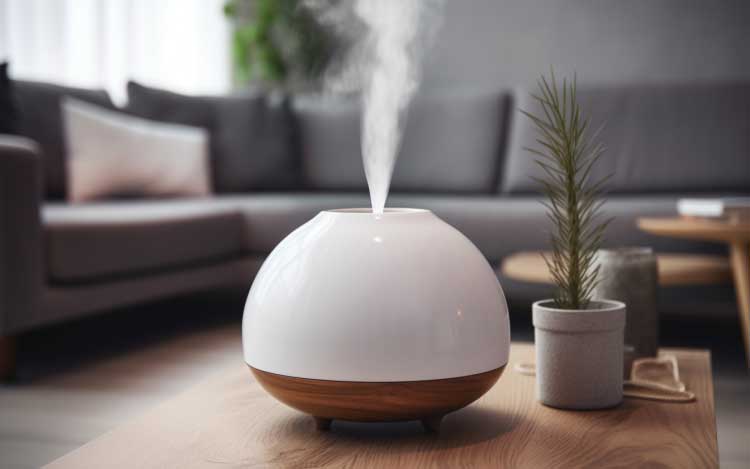

You now understand several differences between diffusers and humidifiers. Consider many factors to ensure you choose the perfect option for your needs.
One of the first things you must consider is the specific needs of your household. A humidifier might be more beneficial if you live in a dry climate or use heating systems that dry out the air. On the other hand, if you’re interested in aromatherapy or want to create a specific mood in your home, a diffuser would be a better choice.
The impact of diffusers and humidifiers on our health is another important factor. Diffusers can provide therapeutic benefits depending on the essential oils used. For instance, lavender oil can help with relaxation and sleep, while eucalyptus oil can aid with respiratory issues. Humidifiers, on the other hand, can help alleviate symptoms of dry skin, throat, and lips and can also help with symptoms caused by the flu or common cold.
The size of the room is another factor to consider. Larger spaces require a larger or more powerful humidifier to increase humidity. Diffusers, conversely, can be less powerful, as their main function is to disperse essential oils into the air.
The utility is another important factor. If you’re looking for a device that can increase humidity and disperse essential oils, some devices combine the functions of a diffuser and a humidifier.
The impact of diffusers and humidifiers on air quality is also crucial. Both devices can improve air quality but in different ways. Diffusers can reduce dust and allergens in the air, while humidifiers can prevent dryness.
Here’s a list of residential and commercial applications for different types of diffusers and humidifiers:
Aromatherapy: This practice uses essential oils for therapeutic benefits and is best done with a diffuser.
Dry Climates or Winter Months: A humidifier can help maintain a comfortable humidity level in the air.
Yoga Studios or Spas: These places often use diffusers to create a relaxing and calming atmosphere.
Offices: A humidifier can help prevent dry skin and eyes in dry office environments.
Bedrooms: Both diffusers and humidifiers can be beneficial in a bedroom. A diffuser can help create a relaxing atmosphere for sleep, while a humidifier can prevent dryness in the air, which can be particularly beneficial during the winter.
What's the Effect of Diffusers and Humidifiers on Mood and Health?
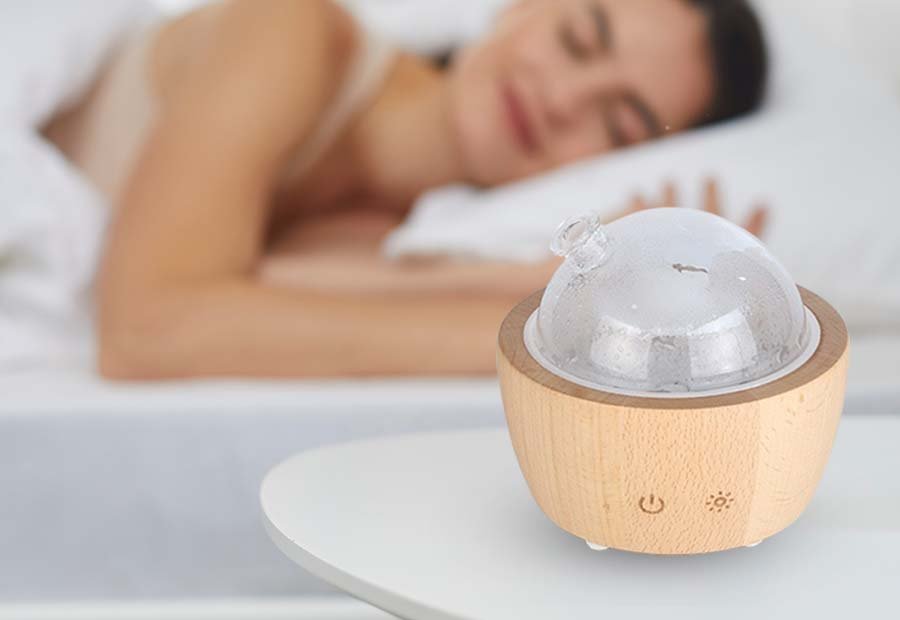
As discussed earlier, it’s important to note that diffusers and humidifiers can significantly affect mood and health. However, the way they influence these aspects is different and depends on their specific functions and uses.
Diffusers can profoundly impact mood, particularly when used with certain essential oils. For instance, lavender oil is known for its calming properties and can help promote relaxation and better sleep. On the other hand, citrus oils like lemon or orange can uplift the mood and boost energy levels. This makes diffusers a great tool for managing mood and creating a desired atmosphere in your home or office.
Humidifiers, on the other hand, primarily impact health by improving air quality. By increasing the moisture level in the air, humidifiers can help alleviate symptoms of dry skin, throat, and lips. They can also help with symptoms caused by the flu or common cold. Moreover, maintaining a healthy humidity level can be beneficial for respiratory health. Dry air can irritate the nose and throat and can exacerbate symptoms in people with respiratory conditions.
In conclusion, while diffusers and humidifiers serve different purposes, both can contribute to a healthier and more comfortable living environment. Whether you choose a diffuser, a humidifier, or a device that combines both functions will depend on your specific needs and preferences.
Specific Applications of Diffusers and Humidifiers
What are the Specific Applications of Diffusers and Humidifiers

A. The Best Use of Diffusers for Aromatherapy
Diffusers are particularly beneficial for aromatherapy. Dividing essential oils into the air can create a soothing and therapeutic environment. For instance, lavender oil can promote relaxation and better sleep, while eucalyptus oil can help with respiratory issues. Diffusers are often used in spaces where relaxation and wellness are prioritized, such as yoga studios, spas, or bedrooms.
B. Comparison of the Effects of Diffusers and Humidifiers on Air Quality
Both diffusers and humidifiers can improve air quality but in different ways. Diffusers can reduce dust and allergens in the air by dispersing essential oils with antibacterial and antiviral properties. On the other hand, humidifiers add moisture to the air, which can alleviate symptoms of dryness and improve respiratory health. However, it’s important to note that overuse of humidifiers can lead to excessive humidity, promoting mould growth and dust mites.
C. The Suitability of Humidifiers for Dry Climates
Humidifiers are especially suitable for dry climates or during winter when heating systems can dry out the air. By increasing the moisture level in the air, humidifiers can help prevent dry skin, throat, and lips and can also help with symptoms caused by the flu or common cold. In addition, maintaining a healthy humidity level can be beneficial for respiratory health, as dry air can irritate the nose and throat and exacerbate symptoms in people with respiratory conditions.
Conclusion

Choosing between a diffuser and a humidifier is a decision that should be based on your specific needs and preferences. Both devices offer unique benefits that can greatly enhance the comfort and quality of your living environment.
Diffusers, particularly when used with essential oils, can create a soothing atmosphere and offer therapeutic benefits. They can help manage mood, promote relaxation, and improve air quality. On the other hand, humidifiers add moisture to the air, which can alleviate symptoms of dryness and improve respiratory health. They are particularly beneficial in dry climates or during winter when indoor air can become excessively dry.
In the debate of diffusers versus humidifiers, it’s important to remember that there’s no one-size-fits-all answer. The best choice depends on your individual needs, the specific conditions of your living environment, and your personal preferences. For instance, a diffuser might be the best choice if you’re primarily looking to create a relaxing atmosphere and enjoy the benefits of aromatherapy. If, however, you’re dealing with dry air and its associated discomforts, a humidifier could be more beneficial.
In conclusion, whether you choose a diffuser, a humidifier, or both, each device can create a healthier, more comfortable living environment. The key is to understand the specific benefits of each and make an informed decision based on your needs and preferences.
Medical Disclaimer
A. The Purpose of the Content
The information provided in this discussion is intended for informational purposes only. It enhances understanding and knowledge about diffusers and humidifiers and their potential benefits and uses.
B. The Importance of Seeking Professional Medical Advice
However, this content should not be used as a substitute for professional medical advice, diagnosis, or treatment. It is crucial to consult with a healthcare professional for any health-related concerns or questions. Always seek the suggestions of your physician or other qualified health provider with any problems you may have regarding a medical condition. Never disregard professional medical advice or delay looking for it because of something you have read here.
Buy Aroma Diffuser from AromaLeap
Now that you know the key differences between diffusers and humidifiers, selecting the right product for your aromatherapy needs is only halfway done. It would help if you connected with the right aromatherapy product provider to capitalize on your newfound knowledge. AromaLeap is a renowned manufacturer of premium aromatherapy products, offering a wide range of essential oil diffusers: ceramic diffusers, nebulizing diffusers, essential oil, scented candles, and more.
With our roots grounded in customer-focused manufacturing, we at AromaLeap strive to cater to our patrons’ specific needs and preferences. Interested in finding the perfect diffuser to suit your lifestyle? Don’t hesitate to contact us with your aromatherapy equipment queries, and let us assist you in making the most informed decision.

